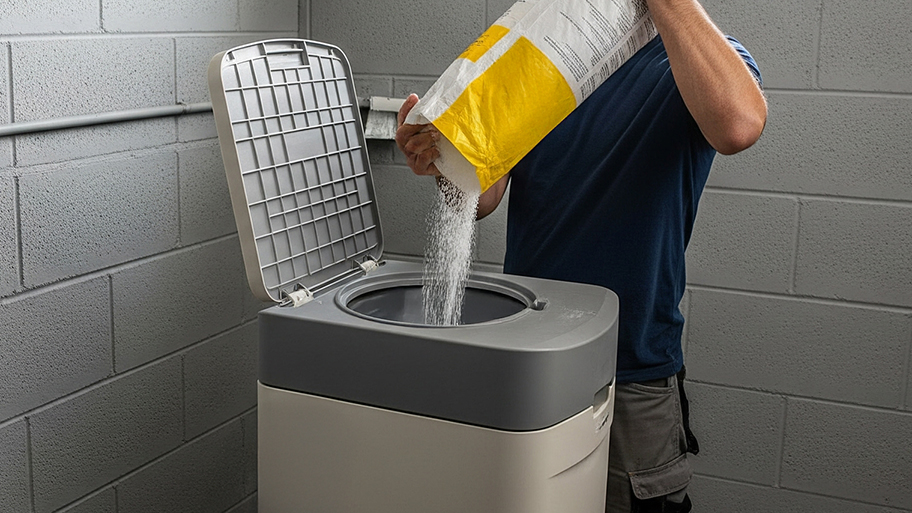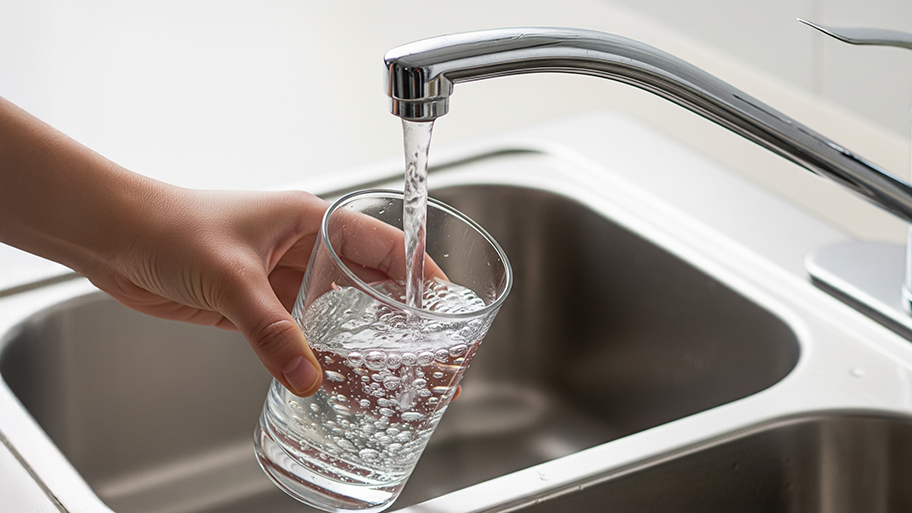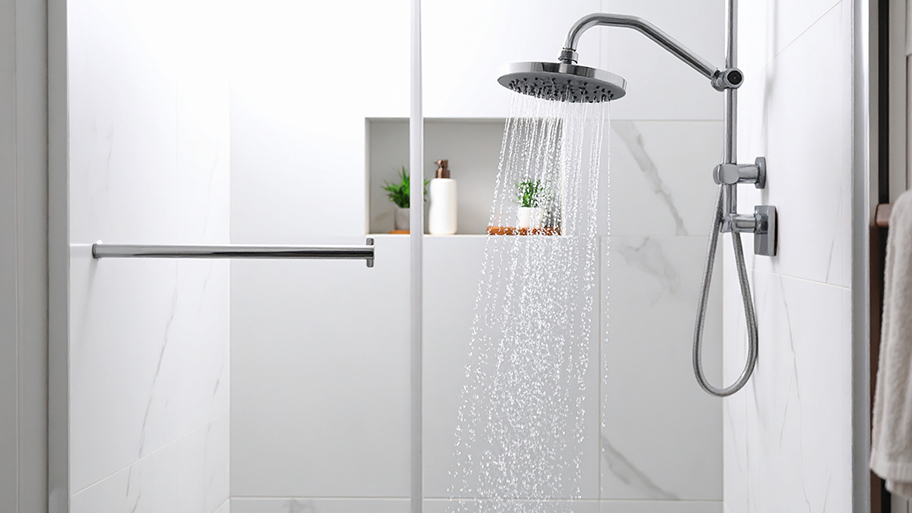
How much a water softener costs depends on your home’s size, and the system’s type and capacity. Our expert guide explores all the price factors.
Here’s a comparison worth its salt


Salt-free water softeners alter the chemistry of water but do not remove hard minerals.
Salt-based water softeners do remove minerals but are not allowed in all areas.
Salt-based water softeners are more budget-friendly at $1,500 on average.
Salt-free water softeners are less maintenance but cost more, between $800 and $4,000.
Hard water can be hard to live with. If you’re tired of having dry skin and hair and dealing with stubborn limescale on faucets and showerheads, then it’s time to install a water softener system. Here’s what you need to know when choosing between a salt-based versus a salt-free water softener.
As their names suggest, the presence or absence of salt defines how these water softeners work. Salt softeners use salt to remove minerals like calcium and magnesium, while salt-free softeners use potassium to condition the hard water instead. Additionally, salt-free systems aren’t as effective at eliminating limescale buildup, and salt-based water softeners require a fair bit more maintenance.
Salt-based water softeners use salt to remove hard minerals like calcium and magnesium. This prevents limescale buildup, which is excellent news for your appliances, faucets, and other fixtures (not to mention your wallet). Less limescale in your plumbing means a longer life span and fewer premature repairs across all your water-using appliances. Here are some pros and cons of a salt-based water softener:
| Pros | Cons |
|---|---|
| Budget-friendly | Not legal everywhere |
| Removes hard minerals | Needs a pro installer |
| Better for bathing | More maintenance |
Best for:
People who have sensitive skin
Smaller household budgets
Let’s take a closer look at the advantages of salt-based water softeners:
Budget-friendly: Salt-based water softeners cost $1,500 on average, depending on the size and model installed.
Removes hard minerals: The salt actually removes hard minerals like calcium and magnesium. Say goodbye to hard water stains.
Better for bathing: The softer water that results from mineral removal means that your soap and shampoo lather up better and rinse out more easily, resulting in softer hair and skin.
Now let’s dive into the disadvantages of salt-based water softeners:
Not legal everywhere: Not all municipalities take kindly to the brine-based backflushing from salt softeners. In fact, they might even be illegal in your area.
Needs a pro installer: Sorry, DIYers, but salt-based water softeners need electricity to operate. Plus, any small error in installation could mean major water leaks and damage in your home. It’s safer and easier to leave it up to a local water softener installer.
More maintenance: The salt that your system requires to actually do its job has to come from somewhere. That somewhere is you. Don’t forget to put “add salt to softener” on your weekly task list.
Salt-free water softeners use potassium instead of salt to change the water's chemistry. Instead of being completely removed from the water, the hard-water-causing minerals crystallize when they come into contact with the potassium. This process prevents them from adhering to the interior of pipes and other surfaces.
| Pros | Cons |
|---|---|
| Widely available | More expensive |
| Simpler to maintain | Doesn’t remove minerals |
| Better for low-salt diets | Limescale still builds up |
Best for:
Homeowners who want a low-maintenance solution
People limiting their salt intake
Here are some of the advantages of salt-free water softeners:
Widely available: Since there’s no salt involved, and therefore no salty backwash, most areas don’t object to salt-free water softeners.
Simpler to maintain: Salt-free systems require maintenance biweekly, not weekly, and there are no big bags of salt to contend with during that maintenance.
Better for low-salt diets: If your doctor has ordered you to cut the salt but you desperately need to cut the hard water, too, then a salt-free system is the best choice.
These are some of the main disadvantages of salt-free water softeners:
More expensive: With average costs between $800 and $4,000, salt-free water softeners are more expensive to install than their salt-based counterparts.
Don’t remove minerals: Despite the name “softener,” salt-free systems don’t actually soften the water. Rather, they condition the water and crystalize the minerals instead of removing them.
Limescale can still build up: Again, because the minerals are still in the water, you might find limescale on utensils, dishware, appliances, and faucets—though likely much less than if there were no softener system installed.

Let’s review some of the key features of salt-based and salt-free hard water softeners and see which one is the better option for your home.
Salt-free water softeners are permitted practically everywhere. Salt-based water softeners are subject to local restrictions, and they’re illegal in some places. Get in contact with a local water treatment specialist to see if they’re allowed in your county.
Salt water softeners are the more budget-friendly option because they cost $1,500 on average. Salt-free water softeners, on the other hand, cost between $800 and $4,000. The actual cost will depend on the size of the system. Be sure to discuss your household’s water usage with a water softener company near you to ensure you’re getting the right system for your needs.
Salt-free water softeners have a bi-weekly maintenance schedule, making them easier to take care of. Salt water softeners need weekly maintenance and lots of attention.
Salt-based water softeners can remove hard minerals from water, but salt-free softeners can only alter the water’s chemistry, not remove minerals.
From average costs to expert advice, get all the answers you need to get your job done.

How much a water softener costs depends on your home’s size, and the system’s type and capacity. Our expert guide explores all the price factors.

On average, a reverse osmosis water filter costs around $2,200, but there are a few variables that impact the total price. Learn about them in this guide.

Water softener repair costs can add up, but they’re almost always worthwhile. Use this guide to see what your project is going to cost before you get started.

Are refrigerator water filters good at keeping germs out of fridge water? Explore the pros and cons of refrigerator filters and whether you should get one.

What causes hard water? An excess of minerals, like calcium and magnesium, are the culprit, but water softeners can decrease the problem.

Are water softeners worth it? While they offer benefits to many homeowners, they aren’t always necessary. Learn whether this appliance will pay for itself.